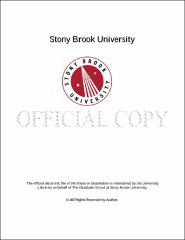Ingenio y honor: el papel de la mujer en el teatro del siglo de oro español.
Ingenio y honor: el papel de la mujer en el teatro del siglo de oro español.
| dc.identifier.uri | http://hdl.handle.net/11401/77680 | |
| dc.description.sponsorship | This work is sponsored by the Stony Brook University Graduate School in compliance with the requirements for completion of degree. | en_US |
| dc.format | Monograph | |
| dc.format.medium | Electronic Resource | en_US |
| dc.language.iso | es | |
| dc.publisher | The Graduate School, Stony Brook University: Stony Brook, NY. | |
| dc.type | Thesis | |
| dcterms.abstract | This thesis examines the role of women in the theatre during the Spanish Golden Age. Special emphasis is made to women in plays written by Lope de Vega, Calderón and Tirso de Molina. An analysis is made on how women as the protagonists, are portrayed in terms of ingenio and honor. The role of women in the comedia is influenced by their adventurous, daring and manipulative personalities. Whereas women in tragic plas (such as those dealing with honor) are viewed as victims of a patriarchal society that imposes a rigorous code of honor. This thesis also includes a short, but concise, analysis of men who, in some sort of way, influence women in the formation of their own destiny within the rules that ran Spain during the sixteenth and seventeenth century. The conclusion establishes the importance of women’s role in the theatre as a mirror of society, even though, it is not an accurate reflection of the everyday life during the Golden Age time. | |
| dcterms.abstract | This thesis examines the role of women in the theatre during the Spanish Golden Age. Special emphasis is made to women in plays written by Lope de Vega, Calderón and Tirso de Molina. An analysis is made on how women as the protagonists, are portrayed in terms of ingenio and honor. The role of women in the comedia is influenced by their adventurous, daring and manipulative personalities. Whereas women in tragic plas (such as those dealing with honor) are viewed as victims of a patriarchal society that imposes a rigorous code of honor. This thesis also includes a short, but concise, analysis of men who, in some sort of way, influence women in the formation of their own destiny within the rules that ran Spain during the sixteenth and seventeenth century. The conclusion establishes the importance of women’s role in the theatre as a mirror of society, even though, it is not an accurate reflection of the everyday life during the Golden Age time. | |
| dcterms.available | 2017-09-20T16:53:19Z | |
| dcterms.contributor | Roncero-López, Victoriano | en_US |
| dcterms.contributor | Firbas, Paul | en_US |
| dcterms.creator | Paravalos, Xenia | |
| dcterms.dateAccepted | 2017-09-20T16:53:19Z | |
| dcterms.dateSubmitted | 2017-09-20T16:53:19Z | |
| dcterms.description | Department of Hispanic Languages and Literature | en_US |
| dcterms.extent | 99 pg. | en_US |
| dcterms.format | Application/PDF | en_US |
| dcterms.format | Monograph | |
| dcterms.identifier | http://hdl.handle.net/11401/77680 | |
| dcterms.issued | 2016-12-01 | |
| dcterms.language | es | |
| dcterms.provenance | Made available in DSpace on 2017-09-20T16:53:19Z (GMT). No. of bitstreams: 1 Paravalos_grad.sunysb_0771M_12824.pdf: 529060 bytes, checksum: 4636c0034f85f111d9799be0c7947259 (MD5) Previous issue date: 1 | en |
| dcterms.publisher | The Graduate School, Stony Brook University: Stony Brook, NY. | |
| dcterms.subject | Literature | |
| dcterms.subject | Golden Age, Honor, Ingenio, Mujer, Spanish, Theatre | |
| dcterms.title | Ingenio y honor: el papel de la mujer en el teatro del siglo de oro español. | |
| dcterms.title | Ingenio y honor: el papel de la mujer en el teatro del siglo de oro español. | |
| dcterms.type | Thesis |

